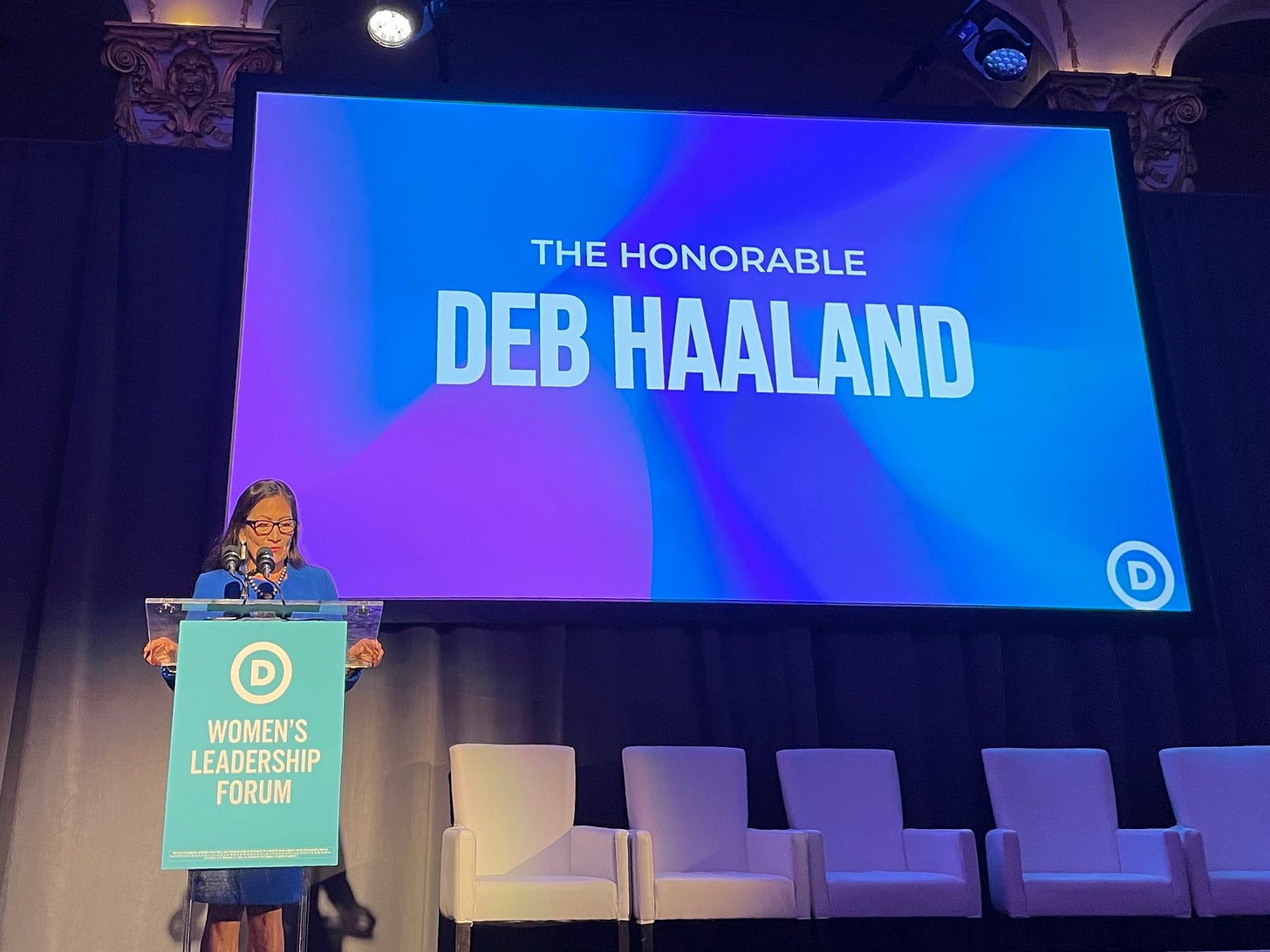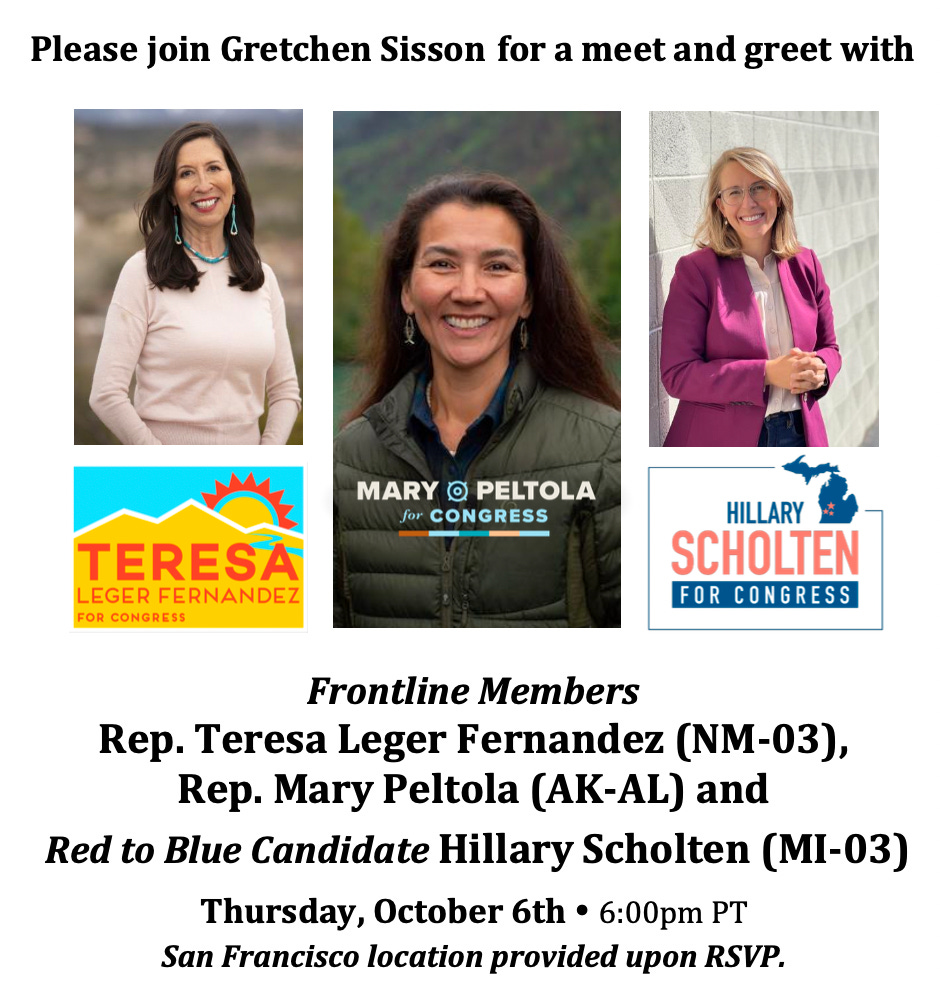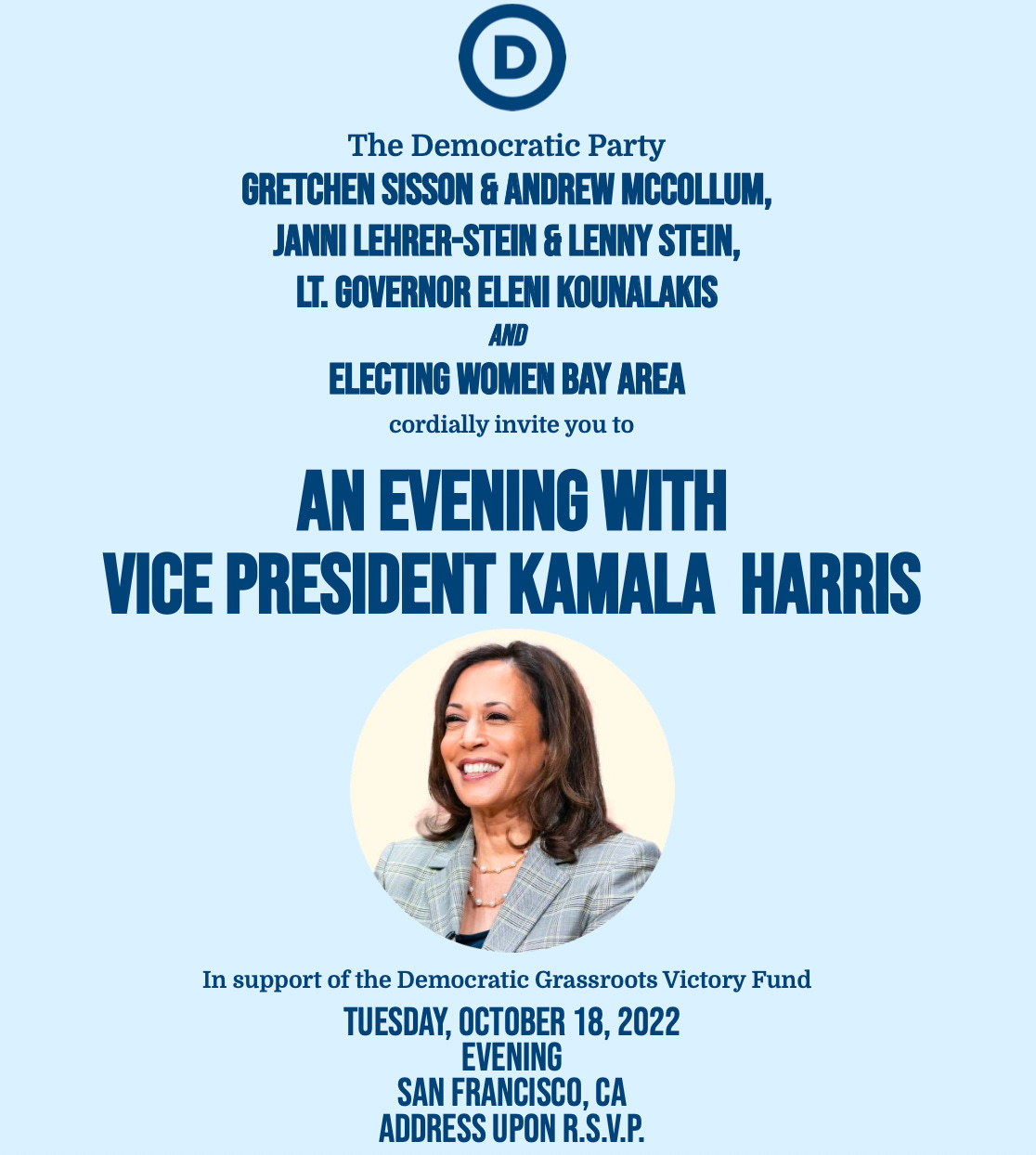Gretchen's List: Indigenous Peoples' Day 2022
Dear Friends,
I rarely do these non-monthly-issue interludes, but I’ve received several questions about Native American candidates recently (and I’ve been writing about the upcoming SCOTUS case Brackeen v. Haaland; more below), so uplifting indigenous leadership has been top of mind. I hope, as we reflect on the history of colonization, displacement, genocide, and coercive assimilation before next Monday’s Indigenous Peoples’ Day that perhaps some of these recommendations will give you tangible ways to devote your thinking and resources to reconciling this history.
This Thursday, I am hosting a reception with Congresswoman Mary Peltola, the first indigenous Alaskan to serve in the House. (Mary will be joined by New Mexico’s Teresa Leger Fernandez and Michigan’s Hillary Scholten.) There is no donation required to join this event, so I encourage you to join even if political events are new or intimidating to you and see what they’re all about.
Best,
Gretchen
P.S. If you’re still looking to move money for November here are your slates for state supreme court justices, state legislators, progressive prosecutors, state governance (governors, secretaries of state, attorneys general), key U.S. House races, and key Senate races. The run-down for how to spend your money based on how much you give was in September’s List, in case you need a refresher.
Where to Give Now: Indigenous and Native American Women Candidates
Last week, I had the absolute privilege of seeing my friend, the Honorable Deb Haaland, while I was in DC. Deb is (of course) our current Secretary of the Interior, but I first met her when she was running for Congress in New Mexico. [During our first phone call, my young children nearly started a small house fire and when I said, “I’m so sorry; I need to go,” she calmly replied: “Don’t worry! I’m a mom, too. And I like putting out fires. That’s why I’m running for Congress.” I swore with that pivot that I’d be on Team Deb forever.] That congressional race wasn’t Deb’s first run — she was in the pipeline in New Mexico for a long time as a Democratic party leader and a candidate for Lieutenant Governor. To get Deb to Congress, we had to get her out of a seven-way Democratic primary. This path is how it usually works: if you want to send Native women to the highest offices in our country, you need to keep them in the pipeline, fund their early campaigns, and get them out of primaries.
That’s what you can do today.
Here is a slate of Native American and Indigenous women running for office across the country. This list is not comprehensive; it does not include every Native woman running. It is meant to target winnable races that still need funds before this November’s election. (And, honestly, it took a ton of work to research this slate because a lot of these races of below-the-radar, so thank you to those experts and advocates who gave input from their states on which races really need money.) More info on their backgrounds and races is included on the slate, but here’s the list:
Congresswoman Sharice Davids, US House (KS-03), Ho-Chunk Nation;
Congresswoman Mary Peltola, US House (AK-01), Yup'ik Eskimo;
Lt. Gov. Peggy Flanagan, Lt. Gov. of Minnesota, White Earth Band of Ojibwe;
Rep. Christina Haswood, Kansas House (District 10), Navajo Nation;
Maxine Dibert, Alaska House (District 31), Koyukon Athabascan;
Rep. Heather Keeler, Minnesota House (District 4A), Yankton Sioux & Eastern Shoshone;
Rep. Barbara Bessette, Montana House (District 24), Chippewa Cree;
Rep. Rynalea Whiteman Pena, Montana House (District 41), Northern Cheyenne;
Shea Backus, Nevada House (District 37), Cherokee Nation;
Charlotte Little, New Mexico House (District 68), San Felipe Pueblo;
Ruth Buffalo, North Dakota House (District 27), Hidatsa/Mandan & Chiricahua Apache;
Collette Brown, North Dakota Senate (District 15), Spirit Lake Sioux Tribe;
Jayme Davis, North Dakota House (District 9A), Turtle Mountain Band of Chippewa;
Red Dawn Foster, South Dakota Senate (District 27), Oglala Lakota;
Peri Pourier, South Dakota House (District 27), Oglala Lakota;
Claudia Kauffman, Washington Senate (District 47), Nez Perce;
Rep. Andi LeBeau, Wyoming House (District 33), Northern Arapaho.
Also, I’d encourage you to check out Advance Native Political Leadership. I am proud to support them (via WDN Action). If you prefer to invest in organizing over candidates, I strongly recommend their action fund. If you’d like to give in this space using a reproductive justice lens, please contribute to Indigenous Women Rising.
What to Read Next: Understanding Brackeen v. Haaland
My work on adoption has made me hyper-aware of the upcoming Brackeen v. Haaland Supreme Court case, which will be argued November 9th. (Yes, the day after election day.) This case asks the Court to consider the constitutionality of the Indian Child Welfare Act (ICWA).
ICWA was passed in 1978, and works to ensure that Native children who are relinquished by or removed from their families are kept within their kinship circle, tribe, or with other Native families. This policy was intended to begin countering prolonged histories of coercive, abusive, assimilative child-taking that began with Indian boarding schools, and continued through the Indian Adoption Project. Brackeen asks SCOTUS to rule this policy unconstitutional with the argument that it discriminates based on race. (It actually preferences families based on tribal affiliation, a political — and not racial — determination.) Not only is this case a core reproductive justice issue, it is a way of attacking tribal sovereignty.
If you’re like to learn more, I recommend:
This Land Podcast, Season 2 by Rebecca Nagle (Cherokee Nation) for the clearest, both in-depth reporting on ICWA and the Brackeen case.
Voices of Indian Adoption by Susan Devan Harness (Confederated Salish Kootenai Tribes) or her book, Bitterroot: A Salish Memoir of Transracial Adoption, to understand what Indian adoption looked like pre-ICWA.
The Indian Child Welfare Act: Preserving Families Is in Children’s Best Interests by Kathryn Fort of the Indian Law Clinic at MSU College of Law. Kate and her clinic colleagues represents the four tribal petitioner/respondents in Brackeen v. Haaland.
Native Reproductive Justice: Practices and Policies from Relinquishment to Family Preservation by Lauren van Schilfgaarde (Cochiti Pueblo) of the San Manuel Band of Mission Indians Tribal Legal Development Clinic Director at UCLA School of Law. van Schilfgaarde helped to co-author the Fire Thunder Native amicus brief in Dobbs.
I share these resources in the hope that this case will receive the attention and scrutiny that it deserves from those invested in reproductive justice, family preservation, and Native sovereignty.
Upcoming Events
Thursday, October 6th, 6pm PT. Please join me for an outdoor reception for frontline Congresswomen Teresa Leger Fernandez (NM-3) and Mary Peltola (AK-AL), and red-to-blue candidate Hillary Scholten (MI-03). There is no donation required to attend this event. Just come, meet the candidates, have a glass of wine, and donate if you feel inspired. RSVP here. Can't attend but want to contribute? Here's your link.
Tuesday, October 18, evening. I am delighted and honored to be hosting a reception with Vice President Kamala Harris to benefit the Democratic National Committee. Please join us in welcoming the Vice President back to the city that first elected her.
Donor, sociologist, researcher. Board member at WDN Action and Emerge America, and steering committee member at Electing Women Bay Area -- but all content here is mine alone and not on behalf of any organization. My goals are to help others find their networks and feel more comfortable and informed participating in the political giving space.
Currently reading: Heart of Fire: An Immigrant Daughter’s Story by Mazie Hirono.




